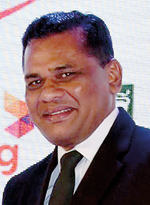Jamaldeen speaks of referees’ role in crowd behaviour

Referees' chief, Nizam Jamaldeen
Rugby referees in Sri Lanka are presently accused of incompetence in handling the Schools’ League. There is concern over the physical fitness of referees in their ability to keep time with the fast-paced schools’ game. Also of concern is the mental fibre referees possess when thrown into a game of great intensity, where the ground climate could turn hostile.
Speaking to the Sunday Times, Nizam Jamaldeen, President of the Sri Lanka Rugby Referees’ Society (SLRRS), said, this however is no reason for crowd violence and such incidents are not justified under any circumstances.
“Spectators are obliged to maintain discipline throughout the game no matter what happens on the field. This is a schools rugby league and discipline is of extreme importance. These are school children playing and their safety cannot be compromised. Also spectators have no right to step on to the field and take matters into their own hands, whatever they may feel about the referee’s decisions,” Jamaldeen said.
He said most of the spectators who behaved in such a manner were ignorant of the game’s rules.
“Passion consumes them and they are at it to win at any cost. This mindset should be removed. One team wins and naturally the other loses. The losing team spectators should accept the outcome gracefully. If they have complains on the officiating of the game there is a standard protocol to report this. The report along with video footage must be submitted to the SLRRS and we will look into it and take action accordingly.”
Jamaldeen refused to acknowledge that the referees were responsible in any way for the way the matches sank into chaos. He placed the blame “entirely” on misbehaving crowds and a lack of security facilities in the grounds.
He said that bad decisions occurred from time to time. “A referee makes about 80-90 calls in a game and a few of them are bound to be mistakes. Up to 15 bad calls per game is acceptable by internationals standards. No referee is perfect. The crowd has to understand this, which they don’t.”
On the question of mental composure, Jamaldeen said the SLRRS conducts workshops and other programmes to help develop this aspect in referees, but said a large part of this could only be gained through experience.
Jamaldeen said this hadn’t been reported to him and therefore he was unaware.
However, he acknowledged that crowd hostility impacted referees badly in that it discouraged youngsters from taking up refereeing, and parents showing reluctance to send their children to be trained as referees. “This is obviously bad for the future of Sri Lankan rugby,” he said.
He denied allegations that referee in any way lacked physical fitness.
“Our referees are physically competent enough to handle the game. I would challenge anyone on this point and would argue that our referees’ fitness levels exceed even those of the players. These are matched up against Asian standards.”
When questioned about a particular instance in the Bradby Shield where the referee was caught lagging mid-pitch and thus couldn’t judge a forward pass, Jamaldeen said it was due to obstructions in the running path and not a lack of pace.
However, Chula Dharmadasa, former President of the Referees Interim Committee, said the current refereeing standards were below par with a special emphasis on stamina and fitness levels.
“While crowd violence cannot be justified at all, there is a separate issue concerning the refereeing standards. It is evident when you watch games. Mistakes and bad decisions occur inevitably, but some of the ‘mistakes’ that happened were pathetic,” Dharmadasa said.
“It is sad to see this happen to Sri Lankan refereeing, which at one point was greatly admired in foreign countries. I blame this on a poor management structure. The young referees should be offered better training to deal with all sorts of match situations,” he said.
On a controversial Television Match Official (TMO) decision in the Bradby concerning a forward pass, Dharmadasa said the TMO training wasn’t sufficient and therefore this was to be expected. He also said the referee should have first consulted the linesman, who was close to where the pass was delivered, before going up to the TMO.
Jamaldeen also acknowledged the shortcomings of the TMO and said this was an area that was still improving as it was only recently implemented in Sri Lanka.
Dharmadasa expressed concerns over how the officiating would be carried out for the remaining matches, a number of whose outcomes are very crucial and would thus be high octane games.
“I personally don’t think the present referees, save a few, are even near competent enough to deal with the upcoming decisive and intense matches. If they aren’t able to cope with this, the authorities should resort to bringing down foreign referees, till the crisis is solved.”
Jamaldeen was against this and said the referees would be able to handle the officiating if the other parties co-operated and security was upped at the venues, as ordered by the Sports Minister.


